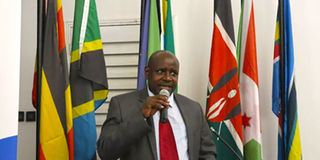Renewed call for Tanzania to join East African ‘One Area Network’

John-Bosco Kalisa, the EABC executive director. PHOTO | FILE
What you need to know:
- The EAC secretariat and the East African Business Council (EABC) insist that the telecommunication costs remain a burden
Arusha. Tanzania and Burundi will continuously be urged to join the East African region’s One Area Network (ONA).
The framework is one of the initiatives intended to harmonize tariffs on voice calls in the region.
Eventually this will reduce the high cost of communication in the East African Community (EAC) bloc.
The EAC secretariat and the East African Business Council (EABC) insist that the telecommunication costs remain a burden.
Mr John Bosco Kalisa, EABC executive director, said had pledged to join the network back in 2015.
ONA, he added, was just one of the infrastructure projects development initiatives for the central corridor.
Besides Tanzania, other countries roped in are Uganda, Burundi, Rwanda and the Democratic Republic of Congo (DRC).
Under the ‘One Network Model’, a call within East Africa across all networks costs the same as a local call.
The framework is already in use in Kenya, Uganda, Rwanda and South Sudan under the Northern Corridor integrated projects.
“We will continuously urge Tanzania and Burundi to join the network,” insisted Mr Kalisa during his meeting with EAC secretary-general Peter Mathuki.
They reiterated their call for harmonization of air passenger and air services charges within the region.
The measure would lower the cost of air transport not only in the EAC but in Africa and hence boost development.
This can best be done through implementation of yet another framework; the Single African Air Transport Market (SAATM) agreement.
The SAATM is a project of the African Union to create a single market for air transport in Africa.
Once fully in force, it is supposed to allow significant freedom of air transport in Africa, advancing the AU’s Agenda 2063.
The high cost of air transport in the EAC has been in the spotlight for years with repeated calls for governments’ interventions.
Recently, the East African Legislative Assembly (Eala) called on the EAC organs to expeditiously devise strategies to lower them.
Friday’s deliberations between the EAC secretariat and the EAC centred on tripling intra-regional trade.
Other matters discussed were measures proposed to enhance business competitiveness by eliminating barriers to trade and investment.
The EABC outlined the regional private sector policy agenda for the year 2023 and areas of partnership with the EAC.
They include fast-tracking elimination of persistent non-tariff barriers (NTBs) by enhancing mechanisms for their elimination.
It emerged that barriers to trade have been caused by, among others, inadequate coordination among the numerous regional institutions involved in testing and clearance of goods at the borders.




